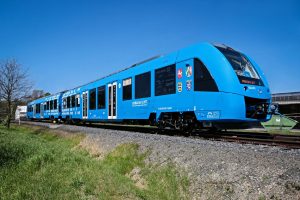 Alstom has joined the Spanish Hydrogen Association showing its commitment to sustainable mobility and the promotion of hydrogen as an energy vector in the decarbonisation process of our society.
Alstom has joined the Spanish Hydrogen Association showing its commitment to sustainable mobility and the promotion of hydrogen as an energy vector in the decarbonisation process of our society.
“Hydrogen technology is a sustainable, noiseless and emission-free alternative for non-electrified lines. The hydrogen train is a demonstration of Alstom’s commitment to the development and implementation of innovative sustainable mobility solutions that contribute to the global energy transition and decarbonisAlstom has joined the Spanish Hydrogen Association showing its commitment to sustainable mobility and the promotion of hydrogen as an energy vector in the decarbonisation process of our society. ation”, Leopoldo Maestu, Managing Director of Alstom Spain said.
Spain has more than 5,000 km of non-electrified lines, representing approximately 35% of the rail network, which are operated by diesel trains and locomotives. More than 200 diesel traction trains currently circulate on the Spanish railway network for freight and passenger transport. Hydrogen is a consolidated alternative for these lines in the mid-term, as reflected in the “Hydrogen Roadmap” recently approved by the Spanish Government. The objectives of this Roadmap for 2030 include the commercial operation with hydrogen trains of at least two railway lines in Spain. Hydrogen, as a sustainable energy vector, will be key to achieve climate neutrality before 2050 with a 100% renewable electricity system.
Currently in Europe, 80,000 kilometres of the main railway lines are not electrified representing 40%. Traffic on these lines is operated by about 12,000 diesel vehicles of which 5,900 diesel trains and 5,800 diesel locomotives. For this reason, many countries, such as Germany, France, Netherlands, Austria, Italy and the United Kingdom have plans to incorporate hydrogen technology in rail transport.
The tests conducted, both in Germany and in other European countries, have demonstrated the reliability, safety, and feasibility of fuel cells as an alternative to diesel traction on non-electrified lines.
Since its foundation in 2002, the Spanish Hydrogen Association (AeH2), a benchmark agent in the hydrogen sector, has worked to encourage, promote and drive the technological and industrial development of hydrogen technologies in our country, and that their positive impact reverts to Spanish society and the economy.
AeH2 works hand in hand with public institutions to promote the development of green hydrogen in Spain and, in coming months, will begin with the elaboration, in an agreed manner with all sector agents, of the Sectoral Agenda of the Hydrogen Industry at the request and with the support of the Ministry of Industry, Trade and Tourism (MINCOTUR).
AeH2 is made up of a group of companies, public and private institutions, and individuals, who share their interest in achieving the main purpose of the association.
Share on:



